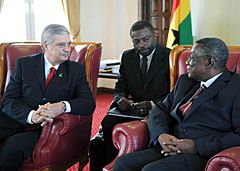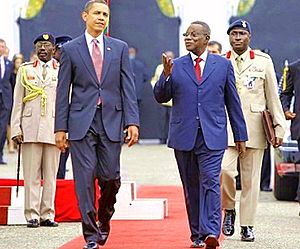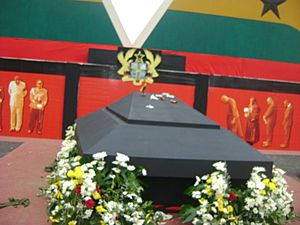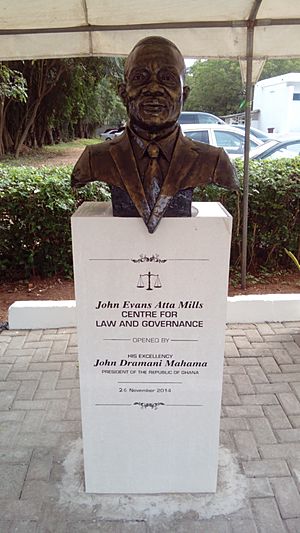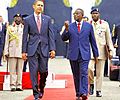John Atta Mills facts for kids
Quick facts for kids
John Atta Mills
|
|
|---|---|
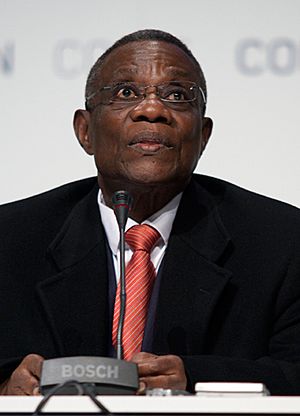
Mills in 2009
|
|
| President of Ghana (3rd President of the 4th Republic) |
|
| In office 7 January 2009 – 24 July 2012 |
|
| Vice President | John Dramani Mahama |
| Preceded by | John Agyekum Kufuor |
| Succeeded by | John Dramani Mahama |
| Vice President of Ghana (2nd Vice-President of the 4th Republic) |
|
| In office 7 January 1997 – 7 January 2001 |
|
| President | Jerry John Rawlings |
| Preceded by | Kow Nkensen Arkaah |
| Succeeded by | Aliu Mahama |
| Personal details | |
| Born |
John Evans Fiifi Atta Mills
21 July 1944 Tarkwa, Gold Coast (now Ghana) |
| Died | 24 July 2012 (aged 68) Accra, Ghana |
| Resting place | Asomdwee Park, Accra, Ghana |
| Political party | National Democratic Congress |
| Spouse | Ernestina Naadu Mills (née Botchway) |
| Children | Sam Kofi Atta Mills |
| Alma mater |
|
| Notable Awards |
|
| Occupation | Law Professor |
| Institution | University of Ghana, Legon |
| Field | Tax law |
| Positions | National Tax Commissioner, Internal Revenue Service (1988–1996) |
John Evans Fiifi Atta Mills (born 21 July 1944 – died 24 July 2012) was a Ghanaian politician and smart legal expert. He served as the President of Ghana from 2009 until he passed away in 2012. He became president on 7 January 2009, after winning the 2008 election. Before that, he was the Vice-President from 1997 to 2001 under President Jerry Rawlings. He tried to become president in 2000 and 2004 but didn't win those times. He was the first Ghanaian leader to die while still in office.
Contents
Early Life and Education
John Atta Mills was born on 21 July 1944 in Tarkwa, a town in Ghana. His father, John Atta Mills Sr., was a teacher. John was the second child and first son in his family of seven siblings. His family came from Ekumfi Otuam in the Central Region of Ghana.
He went to primary and middle school in Huni Valley and Komenda. For his high school education, he attended the famous Achimota School. He then studied law at the University of Ghana, where he earned his first law degree in 1967.
Mills continued his studies in London, England. He got a master's degree in law from the London School of Economics in 1968. By 1971, at just 27 years old, he earned his PhD in Law from the SOAS School of Law, part of the University of London. His special area of study was about taxes and how they help countries grow.
Starting His Career
After finishing his studies, John Atta Mills became a lecturer at the Faculty of Law at the University of Ghana. He taught there for almost 25 years. In 1971, he was chosen for the Fulbright Scholar program, which allowed him to study at Stanford Law School in the United States.
He also taught as a visiting professor at Temple University in the USA and Leiden University in the Netherlands. During these years, he wrote many articles about taxes.
Outside of teaching, Mills worked for the government. He was the acting head of Ghana's Internal Revenue Service from 1988 to 1993. Then, he became the full head of the service from 1993 to 1996. By 1992, he was a highly respected Associate Professor of Law at the University of Ghana.
Entering Politics
Becoming Vice-President
In 1996, President Jerry John Rawlings chose John Atta Mills to be his running mate for Vice-President. They won the election, and Mills served as Vice-President from 1997 to 2001. During this time, he was in charge of the Police Council of Ghana and the team that managed the country's economy.
Running for President
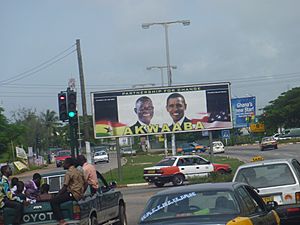
After President Rawlings finished his terms, John Atta Mills became the candidate for his party, the NDC, in the 2000 presidential election. His main opponent was John Agyekum Kufuor from the New Patriotic Party (NPP).
In the first round of voting, Mills got 44.8% of the votes, while Kufuor got 48.4%. This meant they had to have a second round of voting. On 28 December 2000, Kufuor won with 56.9% of the votes and became president.
Mills ran for president again in 2004, but he was defeated by President Kufuor once more.
He didn't give up! On 21 December 2006, he was chosen again to be the NDC's candidate for the 2008 presidential election. He won his party's vote by a huge margin. In this election, President Kufuor could not run again.
Mills' main opponent was Nana Akufo-Addo from the NPP. Mills' campaign slogan was "A Better Man for a Better Ghana." He promised to improve the lives of Ghanaians. The first round of voting was very close, so a second round was needed. The final result was a victory for Mills, who won with 50.23% of the votes.
John Atta Mills became the third president of Ghana's Fourth Republic. He was sworn in on 7 January 2009. His hard work and determination finally paid off.
His Time as President
As president, John Atta Mills achieved many important things for Ghana. He oversaw the start of Ghana's oil production, which brought new wealth to the country. He also helped other parts of the economy grow.
Economy and Growth
Under President Mills, Ghana's economy became very stable. The cost of living (inflation) went down a lot, reaching one of the lowest rates in 42 years. This showed that his government was managing money wisely. The Ghanaian currency, the Cedi, also became stronger.
In 2011, Ghana was one of the fastest-growing economies in the world. The country's budget deficit (when the government spends more than it earns) was greatly reduced. Foreign companies also invested more money in Ghana, showing confidence in the economy.
His government also started the Single Spine Salary system, which increased pay for all public workers. To collect taxes better, Mills created the Ghana Revenue Authority. These efforts made Ghana a better place for business in West Africa.
Improving Education
President Mills' government increased money given to public schools. They also started programs to give free school uniforms to children in poor areas. Over 100,000 laptops were given to students to help them learn in a modern world.
Free exercise books were also given out, with more than 23 million distributed. The school feeding program, which provides meals to students, was expanded to more schools. The government also paid tuition fees for teachers who wanted to study more.
His administration worked to replace "schools under trees" with proper classrooms. They eliminated almost 1,700 such schools. Two new public universities were also built during his time: the University of Health and Allied Sciences and the University of Energy and Natural Resources.
Better Health for All
During his presidency, many hospitals across Ghana were improved. Old facilities were upgraded, and new equipment and more beds were added, especially at the Tamale Teaching Hospital. His government also built several smaller clinics to make healthcare easier to access.
The National Ambulance Service was expanded to cover all parts of the country. More people also started using the National Health Insurance Scheme, showing better access to healthcare.
Good Governance and World Relations
President Mills kept his promise to have a smaller government. He reduced the number of ministers, saving the country a lot of money each year. He also started a review of Ghana's 1992 Constitution of Ghana to make governance even better.
He made sure that security agencies like the military and police had the right tools. To save money for future generations, his government created the Ghana Heritage Fund in 2011. This fund uses money from Ghana's oil and gas industry.
President Mills was praised by leaders like US President Barack Obama for making Ghana a "good news story" with strong democracy. He also built stronger economic ties with China. His leadership style was calm and brought people together. The BBC described him as a "peacemaker."
Agriculture and Rural Development
Under Mills, the price paid to cocoa farmers increased significantly, reaching the highest level in Ghana's history. Cocoa production also reached a record of 1 million metric tonnes.
His government also worked to bring electricity to more rural communities. National electricity coverage increased from 54% to 72%. This made Ghana the third-best country in sub-Saharan Africa for energy access.
Personal Life
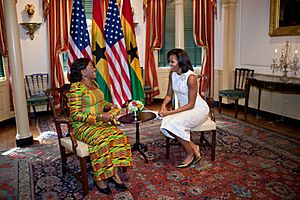
John Atta Mills was married to Ernestina Naadu Mills, who was an educator. They had one son, Sam Kofi Atta Mills. He was raised in the Methodist Christian faith.
He was a good friend of T. B. Joshua, a religious leader from Nigeria. Mills was also very involved in sports. He helped with the Ghana Hockey Association and the Ghana Olympic Committee. He loved field hockey and swimming, and even played for the national hockey team. He was also a fan of the football club Manchester United.
Other Contributions
John Atta Mills was involved in many other important activities:
- He was a member of the Ghana Stock Exchange council.
- He served as the acting head of the Internal Revenue Service of Ghana in 1988.
- He also worked as an examiner for financial institutions in Ghana.
- He was part of the Management Committee of the Commonwealth Administration of Tax Experts.
Illness and Passing
President Mills passed away on 24 July 2012 at the 37 Military Hospital in Accra, just three days after his 68th birthday. His brother later shared that he died from a massive stroke caused by a brain aneurysm. His Vice President, John Dramani Mahama, was sworn in as president on the same day.
State Funeral
From 8 to 10 August, his body was laid in state, allowing people to pay their respects. Many leaders from Ghana and other countries came to honor him. Thousands of people lined up for hours to say goodbye.
The funeral service was held at the Independence Square. It was attended by 18 African leaders, 5 vice-presidents, and many other important international guests. Before the religious ceremonies, helicopters dropped leaflets asking for peaceful elections. The funeral ended with the release of white doves, symbolizing peace.
After the service, President Mills' body was taken in a military procession through Accra. He was buried in a new presidential mausoleum called Asomdwee Park. As a sitting Commander-in-Chief, he received full military honors, including a flypast by jets and a 21-gun salute. It was a very large public event, watched by millions around the world.
World Reactions
Leaders from around the world shared their sadness and respect for President Mills.
- The United Nations Secretary-General, Ban Ki-moon, said Mills would be remembered for his leadership and service.
- French President Francois Hollande called him a "guardian of institutions" and a "defender of Ghanaian democracy."
- US President Barack Obama said Mills was a "strong advocate for human rights" and worked to improve the lives of Ghanaians.
- UK Prime Minister David Cameron praised Mills as a "tireless defender of democracy."
- FIFA President, Sepp Blatter, said Ghana lost a great football supporter.
- Pope Benedict XVI remembered Mills' public service and dedication to democracy.
- The Commonwealth of Nations described him as an "inspiring leader."
- The West African regional body, ECOWAS, said his death took away a "voice of wisdom."
- African Union chairman, Yayi Boni, said it was a "great loss for the country and for the continent."
- Nigerian President Goodluck Jonathan called Mills a "great friend" who believed in peace and economic growth for Africa.
- South African President Jacob Zuma said Mills helped strengthen relations between their two nations.
Selected Writings
John Atta Mills wrote many publications, including:
- Taxation of Periodical or Deferred Payments arising from the Sale of Fixed Capital (1974)
- Exemption of Dividends from Income Taxation: A Critical Appraisal (1977)
- Ghana’s Income Tax Laws and the Investor (1978)
- Ghana's New Investment Code: An Appraisal (1986)
- Africa in the World (2002)
- NEPAD and New International Relations (2002)
Remembering His Legacy
As president, John Atta Mills received the 2009 Glo-CAF Platinum Award for his support of sports. He was also given the 2012 Lifetime Africa Achievement Prize Laureate for his work in democratic governance and development in Africa. This award recognized his calm nature and dedication to fairness.
The Institute of International Education in New York gave him its highest award, The Fritz Redlich Alumni Award. This was because he was the first Fulbright Scholar to become a Head of State in Africa. The Ghana Institute of Management and Public Administration created The John Evans Atta Mills Centre for Law and Governance to honor his commitment to law and good government.
Many places were renamed in his honor:
- Accra High Street became John Evans Atta Mills High Street.
- A street in Cape Coast was renamed President John Atta Mills Street.
- Roads in Suhum and Ga South were named after him.
- The New Millennium City School was renamed President John Evans Atta Mills Educational Centre of Excellence.
- The University of Ghana co-named its Faculty of Law building after him.
- A new community day secondary school in his hometown, Otuam, was named after him.
- The Judicial Council of Ghana renamed its largest court complex after him.
A research center called the Kwame Nkrumah-Atta Mills Legacy Institute was set up to study his political ideas of tolerance and peaceful leadership. Ghana Post also issued special postal stamps with his image to mark World Post Day in 2013. The National Hockey Association started an annual hockey tournament in his memory.
Other memorials include the yearly Atta Mills Memorial Lectures, the Atta Mills Foundation, and the Atta Mills Memorial Research Library. In 2014, Ghana's second floating oil production vessel was named FPSO John Atta Mills. A new girls' boarding house at his old school, Achimota School, was also named in his honor.
Images for kids
See also
 In Spanish: John Evans Atta Mills para niños
In Spanish: John Evans Atta Mills para niños
 | Kyle Baker |
 | Joseph Yoakum |
 | Laura Wheeler Waring |
 | Henry Ossawa Tanner |


